
Ivory Coast, the world’s leading cocoa-producing country, is facing significant challenges as bad weather and diseases threaten cocoa production. In response to these uncertainties, the Ivorian Cocoa Coffee Council (CCC) has taken the decision to suspend cocoa futures sales for the 2023/2024 campaign until further notice.
Yves Brahima Kone, the Director General of the CCC, highlighted the concerns regarding the supply chain. The heavy rains experienced between May 15 and July 10, along with episodes of flooding, have had a severe impact on cocoa production. These adverse weather conditions have created a favorable environment for the spread of brown rot, also known as black pod disease, a fungal disease that affects cocoa trees in prolonged humid conditions. The CCC has acknowledged that the disease is already spreading in many plantations and is actively assessing the situation.
Kone emphasized the potential decline in cocoa production during the first part of the main harvest, and expressed hope that the production from January to March would help balance the volumes. However, if the situation does not improve, it could pose a significant problem for the industry.
Prior to the suspension, cocoa sales had already exceeded one million tonnes, accounting for approximately 50% of the expected harvest of 2.2 million tonnes. The impact of the suspension is expected to affect major buyers such as Cargill, Olam, Barry Callebaut, Hershey, and Nestle. Moreover, with cocoa prices currently at record levels, the suspension of sales will have a significant economic impact, as cocoa accounts for 40% of Ivory Coast’s export earnings.
Farmers, cocoa pod counters, and cocoa exporters in Ivory Coast are bracing for a decline in output during the first part of the main harvest. The CCC had initially projected a total cocoa output of 2.2 million tonnes for the current season.
In an effort to add value to its cocoa production, Ivory Coast has plans to increase domestic cocoa processing to 49% of production starting from October. Currently, only 35-40% of cocoa is processed in the country, while the remainder is exported. The government aims to increase domestic processing to at least 50%. To achieve this, Ivory Coast has entered into agreements with the United Arab Emirates and China for the construction of new cocoa processing plants. These new facilities will significantly enhance the country’s processing capacity, making Ivory Coast the world’s leading cocoa grinder.
The challenges faced by Ivory Coast underscore the vulnerability of the cocoa industry to unpredictable weather patterns and the spread of diseases. The country’s efforts to increase domestic processing highlight its determination to add value to its cocoa sector and reduce its reliance on export earnings. As Ivory Coast navigates through these challenges, the global cocoa market will closely monitor developments in this critical cocoa-producing nation
Stay updated with the latest farming tips and agriculture industry news from Africa by subscribing to our newsletter. Don’t miss out on valuable insights and updates. Follow us on Twitter, LinkedIn, and Facebook to join our farming community and stay connected with us.



















